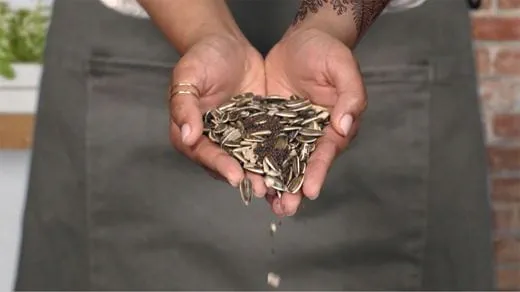FIRST THINGS FIRST: WHAT IS PLANT-BASED EATING?
Like it sounds, plant-based eating means the majority of foods in your diet come from plants – think fruits, veggies, whole grains, legumes (such as beans, lentils and edamame), nuts, seeds, and oils and fats derived from plants. However, plant-based diets aren’t necessarily vegan. They can include small amounts of animal-based foods, dairy products and eggs.
THE HEALTH BENEFITS OF PLANT-BASED:
As Canada’s Food Guide points out, many of the well-studied healthy eating patterns include plant-based foods, and for good reason. Regularly eating more plant-based foods – especially vegetables, fruits, whole grains and plant-based proteins – can mean eating more dietary fibre and less saturated fat. This can have a positive effect on health, including a lowered risk of cancer, heart disease and type 2 diabetes.1,2
But the reasons for eating more plant-based foods go beyond our personal health. It can have a positive impact on the health of our planet too.
THE ENVIRONMENTAL BENEFITS OF PLANT-BASED EATING:
A recent poll suggests that 42 per cent of Canadians think climate change is a national emergency.3 One way to help is to adopt a plant-based diet. The production of plant-based foods often uses fewer natural resources and exerts less pressure on the environment when compared to animal-based foods.4-10
Compared to dairy butter, Upfield’s plant-based margarines and spreads have a 70% smaller carbon footprint based on CO2-eq as a measure of climate change, two-thirds less land occupied per year, and consume half the amount of water.11
A shift toward plant-based eating could help lessen the effects of climate change by contributing to a decrease in greenhouse gas emissions and less land use.4-10
HOW CAN YOU START TO EAT A MORE PLANT-BASED DIET?
Introducing more plant-based foods into your diet is really up to you, but here are some tips to help you get started:
- Ease into it. Aim for one or two plant-based meals a week, then gradually increase over time. Swap out the animal-derived food for plant-based food – whether that is swapping in Becel for dairy butter or chickpeas for chicken. Some recipes recommendations to help get you started: Vegan "Butter Chickpeas" & Cauliflower, Lemon-Herb Grilled Tofu & Vegetable Kabobs and Quinoa Bowls with Golden Turmeric Cauliflower.
- Think local. Visit your local farmer’s market to pick up fresh, seasonal foods like fruits, veggies, and whole grain breads. Let what is in season inspire new recipe ideas.
- Build a meal around a plant-based ingredient. Add an assortment of vegetables, plant-based proteins like nuts, beans or tofu, and top with a simple vinaigrette dressing made with Becel Avo Plus or Becel Olive Plus.
- Choose healthy fats. Think about the fats you’re eating. Plant-based spreads, like Becel, generally have less saturated fat than dairy butter. Replace dairy butter with plant-based Becel in all aspects of your cooking without compromising on taste and performance. Whether you’re sautéing, baking, frying or spreading, find the Becel product best suited to your needs and dietary preferences.
So, there you have it: a plant-based diet is good for you, can be better for the planet, and is easy and delicious. Remember, we’re always here for you with good-for-you plant-based recipes.
*Please see www.becel.ca or the product for full details on ingredients.
Sources:
- Boeing H et al. Critical review: vegetables and fruit in the prevention of chronic diseases. Eur J Nutr (2012) 51:637–63. https://www.ncbi.nlm.nih.gov/pmc/articles/PMC3419346/ Sourced Dec 4, 2019.
- Health Canada. Canada’s dietary guidelines for health professionals and policy makers. 2019 . https://food-guide.canada.ca/static/assets/pdf/CDG-EN-2018.pdf Sourced April 9, 2020
https://toronto.citynews.ca/2019/08/12/canada-climate-change-national-emergency-poll/ - Nelson ME et al. Alignment of healthy dietary patterns and environmental sustainability: A systematic review. Advances in Nutrition 2016;7(6):1005–25. https://academic.oup.com/advances/article/7/6/1005/4568646 Sourced Dec 4, 2019.
- Baroni L et al. Total environmental impact of three main dietary patterns in relation to the content of animal and plant food. Foods 2014;3:443-60. https://www.ncbi.nlm.nih.gov/pmc/articles/PMC5302254/ Sourced Dec 4, 2019.
- Pimentel D and Pimentel M. Sustainability of meat-based and plant-based diets and the environment. https://academic.oup.com/ajcn/article/78/3/660S/4690010 Sourced Dec 4, 2019.
- World Health Organization (WHO). A healthy diet sustainably produced - information sheet. 2018 https://www.who.int/nutrition/publications/nutrientrequirements/healhtydiet-information-sheet/en/ Sourced Mar 9, 2020.
- Scarborough P, et al. Dietary greenhouse gas emissions of meat-eaters, fish-eaters, vegetarians and vegans in the UK. Climatic change. 2014;125(2): 179-192. https://link.springer.com/article/10.1007/s10584-014-1169-1 Sourced Mar 9, 2020.
- Wynes S et al. The climate mitigation gap: education and government recommendations miss the most effective individual actions. Environ Res Lett 2017. https://iopscience.iop.org/article/10.1088/1748-9326/aa7541 Sourced Mar 9, 2020.
- Poore J et al. Reducing food’s environmental impacts through producers and consumers. Science, 2018;360:987-992. https://www.ncbi.nlm.nih.gov/pubmed/29853680 Sourced Mar 9, 2020.




